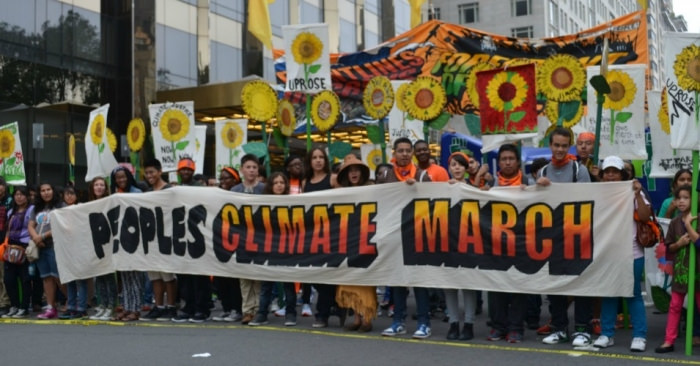I’ll admit that when I first heard about the Peoples Climate March I was a little quick to judge it by the black and green eposter reading “Block Up!”, and failed to investigate its organizational connections. So when 350.org Toronto offered Food Not Bombs London some free spots on their buses to New York for the weekend of the Climate March, and a budget to cook a few meals for a couple hundred, I didn’t think much of it.
Lots of NGOs endorse political actions and use their money to help people travel to participate in sponsored actions and most, if not all, NGOs, organizations, groups and people are imperfect in some way, as we are all the product of an imperfect system. So like many others, I took 350.org’s connection to the Climate March with a grain of salt and figured that a free trip to New York would make for a fun, actionpacked weekend of radical activism with likeminded comrades old and new…just what a depressed anarchist needs to feel some inspiration. Besides, it meant I would be able to see my sister for the first time in about 3 years, if only for a couple of hours.
About an hour before we left town I listened to an interview with Indigenous activist and land defender Amanda Lickers of Reclaim Turtle Island, who had the critical analysis of the Climate March that I lacked. In this interview she discusses the corruption of superstar figures like Bill McKibben and Naomi Klein, who often use their fame to rally support for NGOs such as McKibben’s own 350.org, pushing their involvement in social movements and actions including the Climate March and promoting them as neverbeforeseen, historymaking events that will “change everything” while completely erasing movements by oppressed and marginalized groups.
For example, Jaggi Singh of No One Is Illegal Montreal recently caught McKibben tweeting about how the Peoples Climate March was the “largest political gathering about anything in America in at least a decade”, which is 100% wrong, as Singh reminded him of the millions of immigrants and migrants mobilizing for their rights over the years. As Singh put it, McKibben was essentially erasing social movement history that didn’t have the same financial and institutional backing as the Climate March.
These people and organizations have a history of completely disregarding the connections between environmental destruction, capitalism and historical as well as ongoing colonial violence. Indigenous voices are often not included in organizational processes nor are these lands acknowledged to be under colonial occupation. In fact these things tend to be deliberately erased from the conversation in favour of an activist culture that perpetuates Indigenous Tokenism (in other words, let’s ask some of our Indigenous friends to show their faces at our event to make us look like good settlers), support for bandaid solutions to climate change that continue to exploit the most vulnerable, as well as political and corporate diplomacy and an overall deradicalization of grassroots movements in the spirit of humanism and “coming together”. Just because there was an Indigenous contingent during the march does not mean that this event was inclusive of Indigenous Peoples. It wasn’t.
The list goes on and on as to why 350.org is problematic. I’ll admit that until I listened to Amanda’s interview I had no idea just how connected this march was to them. This was, of course, my own fault for not doing my research and judging by the call out for a black bloc. But anyhow, I thought the Climate March was about finally annihilating Wall Street to kick off a radical anti-colonial environmental movement, not some white CEO getting worshipped by ecohipsters because he recycles. Another epic fail is the fact that the Peoples Climate March was approved by the NYPD.
One of the most important rules to keep in mind when changing the system is that we should not cooperate with those who work to uphold it. Why would we work with those who work against us? It makes no sense, unless of course, you still plan on benefiting from the system while mobilizing radical activists to serve yourself…which is exactly what I thing that people like Bill McKibben do.
But here’s the thing: in and of itself, the Peoples Climate March was necessary and great as a political action. People SHOULD be marching in New York City, in every city, to speak out about not only climate change but capitalism, colonialism, censorship, corruption, war, racism, rape culture, heteronormativity and transphobia, police brutality, and more.
We SHOULD be taking the streets with our floats and signs and molotov cocktails and our voices, not just as demonstrations to prove a point but as insurrections to take what is rightfully ours…or I suppose I should say, so that Indigenous folks can take back what is rightfully theirs and decide for themselves what they want from the rest of us. But the problem is that everyone wants to talk about the work of big NGOs and celebrities and how their support benefits the movement rather than the fact that WE DON’T NEED SUPPORT FROM THESE PEOPLE. We can do this ourselves. We just have to decide to do it.
About 300,000 people participated in the Peoples Climate March. Clearly, we have the numbers. So can we do it for real sometime? Can we separate ourselves from NGOs and politicians already and just do what needs to be done, rather than go home after we’ve had our fun and settle back into our privileged lives? The survival of the human species depends on it, after all.
Bailey Lamon is a writer and photojournalist for The Indignants London.



